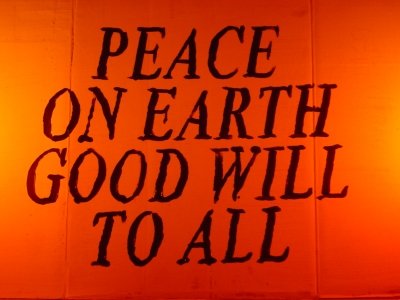
‘Christmas is always a wonderful time of the year because it’s a time when people instinctively, intuitively turn to family,’ Cardinal Donald Wuerl, Archbishop of Washington, DC. said. ‘They also turn to the whole experience of love in their lives. And we come together as family, because we love our family.’
But our own family is only part of the equation, Wuerl stresses.
‘It’s a reminder to us that we’re part of a bigger family, God’s family,’ Wuerl says. ‘We’re called to love not only just the members of our family, but all of those around us.’
I quote Wuerl not because I like these comments, but because they’re a reflection of most religion, not just Catholicism but all religion.
Yet religion, we’re told, is the basis for capitalism, for freedom, for private property, for small ‘r’ republicanism and for individual rights.
How can this be?
How do you justify private ownership over your property and your life with an obligation to be a part of a ‘bigger family’?
What does it mean to be part of a bigger family?
I have always questioned that you’re automatically obligated to love your family of origin. You did not choose them and have no say in what they do. As a helpless infant and an undeveloped, uninformed young child, you are subject to parental neglect, even abuse or evil. Are you supposed to love this? If not, how does this square with the platitudes of Cardinal Wuerl, speaking for all Christians and even all religions?
It’s bad enough to imply that you’re obliged to love your family, regardless of what they do to you, and regardless of whether they have earned your respect and love.
But ‘social brotherhoodists’ such as Wuerl go further and claim that we’re obliged to love everyone on earth equally, regardless of their personal importance to us, and regardless of their own personal desirability, character or worth.
It’s ironic. Religions teach that there’s such a thing as good and bad, as right and wrong, as moral and immoral. Do I share their definitions of these things? Not for a minute. But I agree with them that these are valid concepts. Yet how do they claim there’s a good and a bad, a right and a wrong, and then turn around and say, ‘We’re all brothers and sisters, and you must love each other equally and fully’?
Oddly enough, it’s the secularists, the agnostics and the atheists who put into practice the social ‘ideals’ of Cardinal Wuerl and the conservative Christians and Catholics.
Obama claims to be Christian. In fact, he’s probably a Muslim. More importantly, he’s a multiculturalist. He doesn’t care what religion you are, or whether you’re religious at all—so long as you accept Cardinal Wuerl’s creed that we are all brothers, and therefore we are all our brother’s keepers.
People who agree with me that capitalism and freedom are good, but who disagree with me about religion, write me with hostility. They say, ‘Religion is the base for morality. You cannot have a free society of free people without a moral base.’ I agree with the second, but not with the first.
It’s true that you cannot have a free society if the people are not good—i.e., honest, filled with integrity, willing to take full responsibility for their own happiness and lives, and willing to assert their right to pursue those things unimpeded by any force, including government.
But you cannot spout Cardinal Wuerl’s prattle—the same prattle Obama and his leftist Establishment spouts—and then claim to have made a base for freedom.
You cannot tell me, as both Obama and Cardinal Wuerl do: ‘You ARE your brother’s keeper,’ and then in the same breath tell me: ‘You are free.’ These two things are completely incompatible.
In this holiday season, we’re told that benevolence, peace on earth and good will toward men are important. Indeed they are. But you don’t foster good will and peace by enslaving people in concentration camps or collective farms or (same principle) Obama’s coercive health care collectives. You don’t foster peace and good will by enslaving men and women to one other—first in the ideas of morality, then in political and social practice.
Ironically enough, the only way to ensure peace and good will among human beings is to leave them alone, and to tell they that they are not one another’s keepers. When left free, humans focus on what’s most important, yes, even more important than charity: Survival. When allowed to survive and flourish, humans are more willing to be generous than when enslaved and—because of the poverty and stagnation slavery engenders—have nothing with which to be generous. This is why in freer societies, people are generous and usually kind to one another—and in enslaved societies, it’s dog-eat-dog and people are at their nastiest and worst.
If it’s benevolence and good will you seek, don’t listen to Cardinal Wuerl and don’t listen to Obama. Forget the hatred and hostility bred by the false idea that we are all each other’s keepers.
Merry Christmas, Happy New Year, and here’s an intellectual toast to the idea that some day, hopefully sooner than later, human beings will start to get this right.
Be sure to “friend” Dr. Hurd on Facebook. Search under “Michael Hurd” (Rehoboth Beach DE). Get up-to-the-minute postings, recommended articles and links, and engage in back-and-forth discussion with Dr. Hurd on topics of interest.
